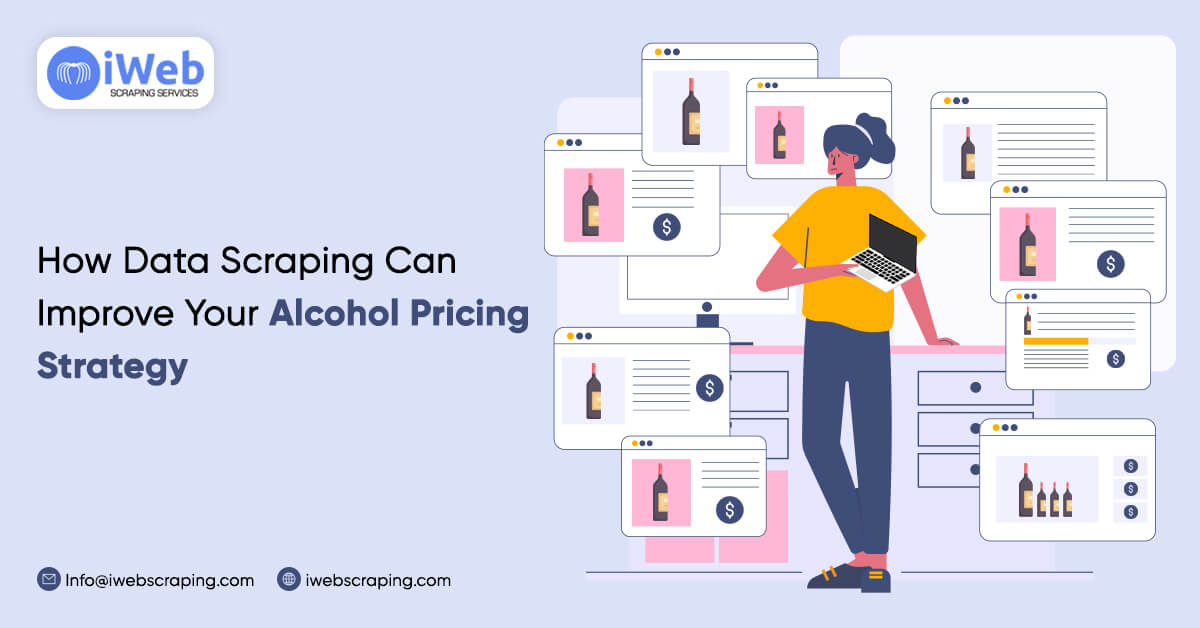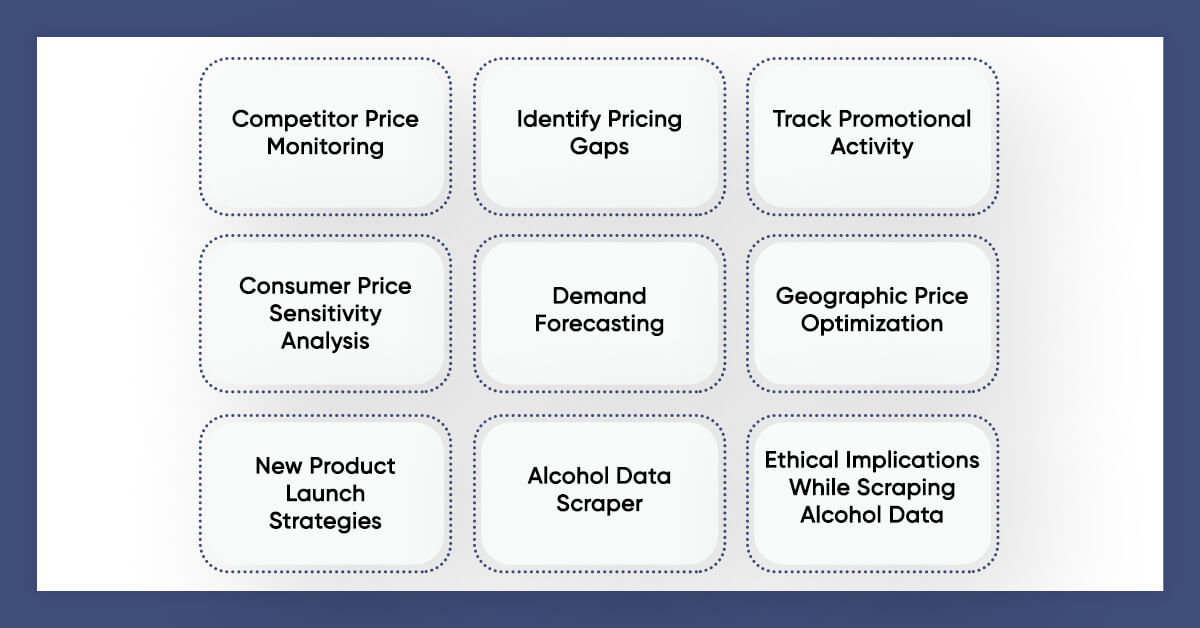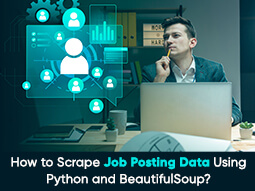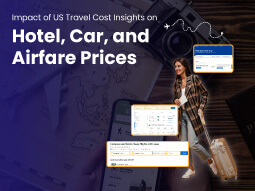How Data Scraping Boosts Your Alcohol Pricing Strategy?

The alcohol business is tough, and the price you set can decide if your brand succeeds or fails. Imagine if you had a special tool to monitor what your competitors are charging, anticipate customer behaviour, and create customized advertisements. Data scraping lets you turn your pricing plan from just guessing into a way to make more money. In this blog, we'll explore how to use this data scraping ethically to increase your profits and, more importantly, to keep your customers happy and returning, thereby enhancing your brand's reputation.
What is Alcohol Data Scraping?
Liquor data scraping automatically extracts specific information from websites and apps related to alcoholic beverages. This information can include:
- Product details: Brand names, types of liquor (whiskey, vodka, etc.), vintages (for wine), and sizes (750ml bottle, etc.)
- Pricing: Current prices of various liquors
- Availability: Whether a particular liquor is in stock
- Promotions and discounts: Any ongoing sales or special offers
- Customer reviews: Ratings and comments on specific products (depending on the website)
By collecting this data, businesses can gain valuable insights into the liquor market.
How Data Scraping Can Improve Pricing Strategy?

Data scraping can be a powerful tool to optimize your pricing strategy for alcoholic beverages. Here's how:
Competitor Price Monitoring
Alcohol data scraping automatically pulls pricing information from competitors' websites and apps. This gives you immediate updates on how your prices compare, revealing if they are higher or lower. You can quickly adjust your prices based on this to keep up with the competition. Tracking these changes over time helps you spot trends and potential price wars that can guide your pricing decisions. You also get alerts about competitors' discounts and promotions, which lets you respond quickly with your own special offers.
Identify Pricing Gaps
Alcohol data scraping can be a powerful tool for identifying gaps in the pricing landscape. This process involves ethically collecting information like competitor prices and product details from online sources. By looking at this information, businesses can spot where they might need to change their prices to stay competitive. For example, data scraping can spot this difference if others sell a certain whiskey for less. This allows you to change your prices to grab customers' attention without losing money. In short, it helps you see exactly where you stand among competitors, showing you where to price your products more appealingly to attract more buyers.
Track Promotional Activity
Alcohol data scraping helps gather up-to-date details on sales, special deals, and package offers. This info lets businesses see how often and what kind of promotions competitors use, revealing their plans and tactics. This knowledge allows businesses to react wisely to what others are doing or create their own unique deals to attract more customers. It also helps plan promotions that match or stand out from competitors' actions or maximize seasonal trends to get the best results.
Consumer Price Sensitivity Analysis
Alcohol data scraping is a handy way to figure out how changing prices might make shoppers more or less likely to buy different kinds of drinks. This method collects information on available products and their prices from online stores. By examining this information, you can see how different price adjustments influence people's choices when it comes to buying alcohol.
For instance, if gathering data shows that making budget beers a little more expensive doesn't slow down their sales, people aren't too worried about small price changes in this area. But, if raising the price of high-end whiskeys causes a big drop in purchases, it shows that buyers are more sensitive to price changes for these pricier items. This insight helps businesses price their drinks in a way that makes the most money while also fitting what customers are willing to spend.
Demand Forecasting
Alcohol data scraping can help predict how much people will want to buy in the alcoholic beverage market. By looking at past sales and price information, you can spot trends in what people like to buy. This way, you can make informed decisions about future sales based on previous events. Data scraping helps notice when certain drinks become more or less popular during the year, which means you can plan your stock levels and prices better to match these changes in demand. Using this knowledge, businesses can make smart choices about how much to produce, what to keep in stock, and how to set prices to make the most money and keep their inventory in good shape.
Geographic Price Optimization
Alcohol data scraping can be a strategic tool for geographically optimizing your pricing strategy. Consumer preferences and regulations can vary significantly by location. Alcohol data helps analyze data to understand local preferences for specific liquors or price points. This allows you to set prices that resonate better with the target audience in each region. This data-driven approach allows you to strike a balance between competitiveness and profitability in each geographic market you serve.
New Product Launch Strategies
Launching a new alcoholic beverage requires a strategic pricing approach. Here's where alcohol data scraping comes in. This helps analyze how competitors priced their recent launches, providing a starting point for your own pricing strategy. Scrape alcohol data on customer reviews and buying behaviour for competitor launches. This sheds light on how price points influence consumer perception of new products. By analyzing competitor pricing, you can find niches where you can position your product at an attractive price point, capturing new market share.
Alcohol Data Scraper
An alcohol data scraper isn't a single software program but rather a term used for tools and techniques that automatically extract specific information about alcoholic beverages from websites and apps.
Here's how it works:
- Target Selection: You decide what data you want, like product details or pricing, and from which websites (e.g., online liquor stores, and restaurant menus).
- Data Extraction: The scraper uses code or automation to navigate the websites and identify the specific data points you're interested in.
- Data Collection: Once identified, the scraper organizes that data into a usable format, like a spreadsheet or database.
There are different ways to perform scraping, with varying levels of complexity:
- Simple Scraping Tools: Browser extensions or basic software programs can be used to scrape small amounts of data from simple websites.
- Coding: Programmers can write scripts to automate scraping from more complex websites.
- Web Scraping Services: Companies offer scraping services for a fee, handling the technical aspects and providing the extracted data.
Ethical Implications While Scraping Alcohol Data
Here are some considerations and rules one should consider while scraping alcohol data.
Respecting Website Terms of Service
- Every website has terms of service (TOS) outlining acceptable use. If not done properly, scraping data might violate these terms.
- Check the TOS for any restrictions on automated data collection.
- Some websites might have APIs (Application Programming Interfaces) that provide controlled data access. If available, consider using these APIs instead of scraping.
Avoiding Denial-of-Service Attacks
- Scraping data involves sending automated requests to websites. Excessive scraping can overload their servers, hindering legitimate users from accessing them.
- Be mindful of the frequency and volume of your scraping requests.
- Implement delays between requests to avoid overwhelming the website.
Data Accuracy and Legality
- Scraped data might contain errors or inconsistencies.
- Have a process to clean and verify the data before using it for decision-making.
- Be aware of copyright laws.
- Avoid scraping data that is explicitly protected or requires specific permissions.
Privacy Concerns (if scraping consumer reviews)
- If scraping customer reviews containing personal information, ensure anonymization to protect user privacy.
- Only collect publicly available data and comply with relevant data privacy regulations.
Conclusion
In the ever-competitive world of alcohol sales, staying ahead of the curve requires sharp pricing strategies. Data scraping sheds light on competitor tactics, consumer trends, and real-time market fluctuations. That's where services like iWeb Scraping Services come in. They provide the tools and expertise to build a customized data pipeline, ensuring you get the most accurate information in real-time to fuel your success.




